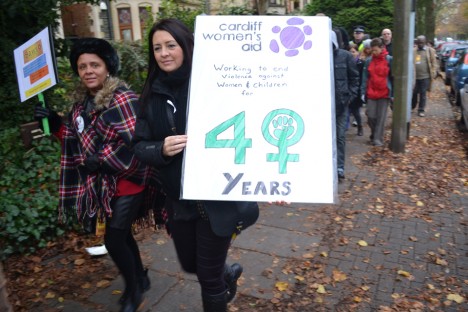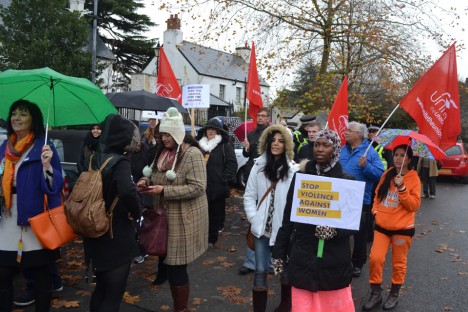The issue of violence against women still carries a stigma, and support groups for victims say that proposals to tackle it don’t go far enough.
It was an overcast Tuesday morning outside Llandaff Cathedral when assembly member Leighton Andrews found himself at the pulpit, in tears and lost for words. The minister for public services was speaking at a multi-faith gathering organised as part of White Ribbon Day, a national day of action calling for an end to violence against women.
He had been moved by two survivors of domestic abuse, who before him had shared their stories with the congregation. One woman, Amina, was regularly forced to select and watch pornography with her husband, after which he would rape her. Another lady, Rachel, survived being shot by her estranged husband in her place of work.
Andrews was there to discuss the Gender-Based Violence Bill now being considered by the Welsh Government. The day’s events underlined what may be good or bad news for the organisations who work to support the victims of violence and abuse – that is, the year on year increase of reported incidents.
“The figure keeps on climbing,” says Tina Reece of Welsh Women’s Aid, “but we know that abuse is widely underreported, so we don’t know if it’s an overall increase in incidents, or if victims are just feeling more confident and response is improving.”
Culture Shift
Groups such as Tina’s work tirelessly to encourage victims to seek help, but figures demonstrate that a stigma persists around the issue of violence against women. A National Union of Students report showed that whilst a staggering one in seven female students experienced serious physical or sexual assault during their time in education, only 10% reported incidents to the police. The most common reason given for this was that the victim felt ashamed, or embarrassed.
This reflects attitudes in the resurgence of so-called ‘lad culture’. A further study by the NUS saw 34% of respondents agree that a woman is either totally or partially responsible for being raped or sexually assaulted if drunk. Thirty six per cent felt the same way about women who act in a flirtatious manner.
The stigma can be even greater for mothers, married women, and those in relationships. “Nobody wants to be seen as a victim,” says Ann Williams of the All Wales Sexual Abuse and Domestic Violence Helpline. “It may be there’s personal shame, or you may want to be seen as in a happy relationship, or perhaps you don’t want the family to know.”
The proposed bill aims to help move along the cultural shift required to remove this stigma, and in doing so help victims and their families get the help they need in coming to terms with what has happened. Rachel’s case made the need for this dreadfully apparent. Her husband would go on to take his own life. Not long after this, their sixteen-year-old son would do the same.
However, changes to the bill have come under fire from numerous groups, along with the exclusion of what they consider essential elements in ending violence against women.
One step forward…
One problem is the change of name from the Violence Against Women bill to the Gender-Based Violence bill. In a recently released response, the NUS described the move as a great disservice not only to women, but to victims of all genders.
“By not openly accepting that this is a gendered issue that overwhelmingly affects women and girls, Wales will be taking steps backwards,” reads the consultation response. Whilst it is universally recognised that men are also subject to abuse, the nature of it is different in that it is not gender-based, and should be approached differently.
 Established 40 years ago, Cardiff Women’s Aid provide support for both women and children affected by domestic violence.
Established 40 years ago, Cardiff Women’s Aid provide support for both women and children affected by domestic violence.“We should seek to eradicate violence against everyone,” reads the report, “but we cannot do this without recognizing the causes of this violence. Men do not suffer violence because they are men.”
Welsh Women’s Aid argue that a further amendment is needed that pushes for greater education around violence against women, particularly, suggests Tina, for those not in education, employment, or training.
Healthy relationships
In the past the Welsh government has run public awareness campaigns around unacceptable behaviour at times of year when violence against women spikes, such as Christmas, or the Six Nations rugby tournament. Support groups say something more consistent is needed however, along with compulsory education in schools.
“We need to put across this idea of what a healthy relationship is for people, that is, what’s acceptable, and what you should and shouldn’t be expecting in a relationship,” said Tina. The very nature of domestic abuse, she continued, can make it extremely difficult for victims to acknowledge what they’re experiencing. “When one person controls another through intimidation, humiliation and making it hard to seek help, that person may have trouble recognizing what’s normal, and what’s not.”
Towards the end of the service at Llandaff Cathedral, Andrews and a number of faith representatives gathered to light a candle, in remembrance of those women killed through violence. It was easy to see among those in the hall the unflinching determination to confront the issues at hand. The Welsh government’s bill, argue support groups, must carry that same determination with it.

